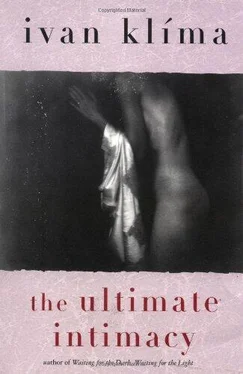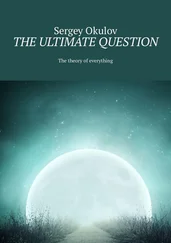Ivan Klima - The Ultimate Intimacy
Здесь есть возможность читать онлайн «Ivan Klima - The Ultimate Intimacy» весь текст электронной книги совершенно бесплатно (целиком полную версию без сокращений). В некоторых случаях можно слушать аудио, скачать через торрент в формате fb2 и присутствует краткое содержание. Год выпуска: 1998, Издательство: Grove Press, Жанр: Современная проза, на английском языке. Описание произведения, (предисловие) а так же отзывы посетителей доступны на портале библиотеки ЛибКат.
- Название:The Ultimate Intimacy
- Автор:
- Издательство:Grove Press
- Жанр:
- Год:1998
- ISBN:нет данных
- Рейтинг книги:3 / 5. Голосов: 1
-
Избранное:Добавить в избранное
- Отзывы:
-
Ваша оценка:
- 60
- 1
- 2
- 3
- 4
- 5
The Ultimate Intimacy: краткое содержание, описание и аннотация
Предлагаем к чтению аннотацию, описание, краткое содержание или предисловие (зависит от того, что написал сам автор книги «The Ultimate Intimacy»). Если вы не нашли необходимую информацию о книге — напишите в комментариях, мы постараемся отыскать её.
The Ultimate Intimacy — читать онлайн бесплатно полную книгу (весь текст) целиком
Ниже представлен текст книги, разбитый по страницам. Система сохранения места последней прочитанной страницы, позволяет с удобством читать онлайн бесплатно книгу «The Ultimate Intimacy», без необходимости каждый раз заново искать на чём Вы остановились. Поставьте закладку, и сможете в любой момент перейти на страницу, на которой закончили чтение.
Интервал:
Закладка:
Admittedly, Daniel considered that at nearly seventeen it might be too late for the boy. He was also a little afraid for his own family, but agreed that they should trust in the essential goodness of their own children.
'Do you know they might release Petr next week?'
'I was expecting they might.'
'Do you think he'll keep it up outside as well?'
'He'll toe the line on your account, if for no other reason.'
Dr Wagner has a wide smile on his broad greyish face beneath a head of greyish hair.
'Good of you to come, Dr Wagner.'
Dr Wagner, by all accounts an excellent lawyer, has been coming to church since he failed to win a seat in parliament. He is an interesting man: well-read and thoughtful, but at the same time there is inside him a surprising emptiness that needs to be filled — through activity, through a career. When his career failed he turned to God. 'One has to draw some spiritual strength from somewhere.' And then he adds unexpectedly, 'It's something that often crosses my mind: there's something wrong with our society. It lacks a spiritual dimension. Nobody is guided by the Ten Commandments any more. And without them everything goes downhill.'
Elder Kodet approaches with his wife and two children. He shakes the minister's hand even more firmly than usual. 'Reverend, I have some good news for you.' He owns a real-estate firm and Daniel entrusted him with the sale of a house which has been returned to him as part of the restitution measures. It had belonged to his father and stood in a excellent location just behind the National Museum. Built
on art nouveau lines, it had even retained the original glass in two of its five balcony windows. He had been given back a house that he had never given a second thought to in his life, and had never hankered after.
'Shall I wait for you in the office?' Kodet asks.
He has no time for that now. He must rush to the airport to collect his sister and then take her to the hospital. Besides, doing business in the temple on a Sunday? In fact, the house frightens him somewhat. He fears that kind of good news. He has never owned a thing in his life and poverty strikes him as more honourable than a life of wealth. It is something he has often repeated in his sermons. Money, like power, deflects one from the essence of life. People who think about money tend to forget about the soul. These past few years have provided repeated evidence of that.
'No, I have to see my mother. I'll come and see you another time. When will you be in your office?'
'For you, any time, Reverend.'
The Soukups are among the last out. They have come without their children, who have no doubt been sent to the grandmothers. It strikes him that Masa's eyes are red from crying. He is concerned about the couple, or rather he is concerned about the husband, who has taken leave of his senses. The father of four small children, he has fallen in love like a teenager and wants a divorce. And Daniel always regarded him not only as wise but also as an ardent and devoted Christian. Even an ardent Christian can fall in love, of course; we are all human after all. But a father of four children ought not to lose his head. His wife is a good soul, evidently sensitive and gentle.
'I'm glad you both came, and together.'
'A fine sermon, Reverend,' Soukup says as he does every Sunday. His wife says nothing. Tears stream down her cheeks.
'Wouldn't you like to call on me some time?'
'Together?' the husband asks.
'I'd prefer to see you both together.'
'Fine.'
His wife merely nods and looks away as if ashamed and humiliated by her husband's infidelity.
While he is shaking her hand he adds, 'Be strong, Masa, and have faith that even if everyone were to let you down, the Lord will never abandon you.' He is excessively blunt. He shouldn't have taken the
service today at all. Brother Kodet would have been only too glad to stand in for him. If he had asked his friend Martin Hájek or his wife, one of them would have preached in his place.
There is less than an hour until the plane lands, so he dashes off to the airport. He left it until last week, when his mother's condition suddenly took a turn for the worse, to call his sister in America. He put off breaking the bad news to her for too long and now he reproaches himself that Rút might not see her mother compos mentis.
Rút lives out in Oregon and they have seen each other just twice in the past twenty-five years. Until recently, they were only able to write about the most banal things, so they preferred not to write at all. But for years Rút used to send him a thousand dollars every Christmas, which amounted to more than his entire annual salary. Last year she even invited him to Oregon.
Rút was born two years before the beginning of the Second World War, while he arrived two years before its end. His sister could still remember air raids and their father's first arrest, whereas he is not sure he remembers his father's first release. He ascribes the difference in their characters to the different times into which each of them was born — or conceived, for that matter. His sister liked to laugh and her loud giggling accompanied his childhood years, whereas he tended to be serious. While his sister read pot-boilers and love stories, he chose War and Peace and Madame Bovary, as well as Plato, Bacon and Calvin's Institutes.
Both grew up in periods when hate was publicly proclaimed as something necessary, useful and unavoidable and when people acted accordingly. Rút refused to take account of it and shut her eyes to the reality. And when at last that was no longer possible, she fled the country. He decided he would challenge hate by choosing a lifestyle based on love. And being a person of conviction, he decided to study theology, at a time when he could be in no doubt that it would mean a life of poverty, with plenty of harassment into the bargain.
He manages to reach the airport on time and from the balcony overlooking the conveyor he catches sight of his sister waiting for her baggage.
When Rút at last appears in the exit, they hug each other, and he takes her travel bag. They then drive with great speed to the hospital.
He guides her to their mother's bed. She is asleep. As the nurses have removed her dentures, her bloodless, yellowing cheeks are deeply
sunken. Her thinning hair hangs in strands over her forehead. Some colourless fluid is flowing down a transparent plastic tube into a needle inserted in one of her veins.
Rút leans over her mother and speaks to her several times. Her mother does not stir. If she fails to come round, Daniel realizes in dismay, he will have wronged both his mother and his sister by preventing them taking leave of each other through his shilly-shallying.
But at that moment, his mother opens her eyes and says: 'Rút, my girl, where have you been gallivanting for so long? You haven't been to see me for at least a week!'
2
Diary excerpts
Shortly after she glimpsed Rút, Mother lapsed into unconsciousness. Hana said to me: 'Your mother's not aware of who's with her now anyway, go and get some sleep. Rutka and I won't stir from her. ' So I went home but I didn't go to bed. I tried to think about something ordinary, to do everyday things. A copy of the Koran was lying on my desk. By sheer chance I opened it at the Bee Sura: 'Your God is one God; as for those who do not believe in the hereafter, their hearts are ignorant and they are proud. '
Last time I visited Petr he said to me: 'Reverend, I'm just beginning to realize I was in Satan's hands and you freed me. '
'That wasn't me, Petr, 'I told him. 'All I did was tell you who could free you. '
He often speaks about his mother. At our first meeting he spoke ill of her, blaming her for divorcing and remarrying and for packing him off to the nursery school and playgroup for days at a time, and in the end she had done nothing to prevent them locking him away. Now he realizes how much he hurt her by the things he did and by the way he behaved. He is sorry and intends to make up for everything.
Читать дальшеИнтервал:
Закладка:
Похожие книги на «The Ultimate Intimacy»
Представляем Вашему вниманию похожие книги на «The Ultimate Intimacy» списком для выбора. Мы отобрали схожую по названию и смыслу литературу в надежде предоставить читателям больше вариантов отыскать новые, интересные, ещё непрочитанные произведения.
Обсуждение, отзывы о книге «The Ultimate Intimacy» и просто собственные мнения читателей. Оставьте ваши комментарии, напишите, что Вы думаете о произведении, его смысле или главных героях. Укажите что конкретно понравилось, а что нет, и почему Вы так считаете.






![Theresa Cheung - The Dream Dictionary from A to Z [Revised edition] - The Ultimate A–Z to Interpret the Secrets of Your Dreams](/books/692092/theresa-cheung-the-dream-dictionary-from-a-to-z-r-thumb.webp)





